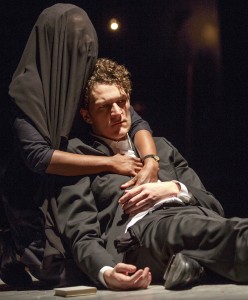The Ma-Yi Theater Company’s Peer Gynt and the Norwegian Hapa Band offers a sonic interpretation of Henrik Ibsen’s saga Peer Gynt. Ibsen wrote Peer Gynt in 1867 as a dramatic poem, and it was staged a decade later with music by Norwegian composer Edvard Grieg that has become famous. The play touches upon Norwegian mythology and folk tales, and it captures the hard and difficult times of mid-19th-century life in Scandinavia.
An Epic Cut Down to Size
John Doyle has made a name for himself with pared-down productions, mainly of musicals—The Color Purple, now on Broadway; Passion and Allegro for Classic Stage Company—and his first foray into traditional plays for CSC, where he is the new artistic director, features that trademark minimalism. Peer Gynt, written in verse and covering a lifetime of its hero, who wanders from Norway’s fjords to the deserts of Arabia to find himself, is an epic journey.
Ibsen wrote his eventful play in 1867 but did not intend it for performance. After a change of heart, he asked his countryman Edvard Grieg to compose music for a theatrical premiere in 1876. Grieg’s Peer Gynt Suite, which grew out of his incidental music, is one of the most lushly Romantic pieces of music of the 19th century. Here, though, Dan Moses’ Schreier’s music features a couple violins that often drone long notes and underscore scenes, and choral writing that features humming by the six actors playing all the subsidiary parts.
The role of Peer Gynt itself stands as an Everest for an actor, yet it comes around far more rarely than Hamlet. Richard Thomas tackled it brilliantly in Hartford in 1989, under the direction of Mark Lamos. Thomas, plagued by boyish looks long after his years as John-Boy Walton, made the most of them in Peer Gynt and convincingly played the young Peer, while assuming the mantle of the older man easily.
At CSC, Doyle has cast Gabriel Ebert, a Tony winner for Matilda, and he’s the best thing about the production. Ebert conveys the young Peer with high-kicking brio and excess of energy, yet in the quieter scenes his maturity comes to the fore. It’s possible to have two actors play the part, but, reduced to less than two hours from four, this adaptation needs only one. The climax of Peer’s long search for his soul—which society claims he lacks—results in his peeling an onion for meaning, and finding nothing in the center. Ebert claws at it and pulls at it with his fingernails, his eyes reddened by the onion fumes, but with more a determined curiosity than desperation.
Peer is notorious for his tall tales. Returning home from wandering, he tells his mother Åse (Becky Ann Baker) that he has hunted a stag into the wilderness, wounded it, and then, about to kill it, been taken on a wild ride by the injured animal. Åse doesn’t believe him and rebukes him, but then comes around.
Even apart from his imaginary experiences, though, Peer’s life is chock full of incident. Åse tells Peer that his girlfriend is about to be married. Peer crashes the wedding and steals her away. He also meets Solveig (Quincy Tyler Bernstine), a young girl—she’s recently been confirmed, so she must be about 14—who falls for him. Then he flees the fury of the bride’s father; he arrives at the lair of the Troll King (Dylan Baker), seduces his daughter, escapes becoming a denizen of the underground, and begins a lifelong journey to distant lands, ending up finally in Norway again.
Doyle’s adaptation touches on most of the events, but it makes them more real. The cue for this approach seems to come when the Bride says, “That’s the way—we mountain people. Everything has another meaning.” Yet the change pulls Ibsen’s play toward the naturalism that characterized his later work, and and even psychological realism, as Peer's struggles seem to become internalized. At times it underscores Peer’s search for himself with heavy-handedness. “Jack, be thyself,” says the Doctor, who is also the Troll King, clad by Ann Hould-Ward in a gray suit, paper crown and sunglasses. Later in the play, Peer becomes a successful businessman, entering in suit and sunglasses himself, and throws money into the air. It may suggest that in his pursuit of success Peer has become more troll-like, but it's also one of the few grand flourishes in the production. Characters like the Boyg, offering “Go round” as strange advice, don’t appear but are rendered as voices of the Chorus.
Although Doyle’s minimalist, modernist approach may force one to focus on the words, the loss of color and variety risks dulling one's senses and resulting in confusion. To anyone who has experienced a full production, this Peer Gynt seems intent on sensory deprivation.
John Doyle's production of Peer Gynt plays at the Classic Stage Company (136 E. 13th. St., between Third and Fourth Avenues) through June 19. Evening performances are at 7 p.m. Tuesday through Thursday and 8 p.m. Friday and Saturday; matinees are at 3 p.m. Saturday and Sunday. Tickets are available by calling the box office at (212) 352-3101, Ovationtix at (866) 811-4111 or visiting classicstage.org.








